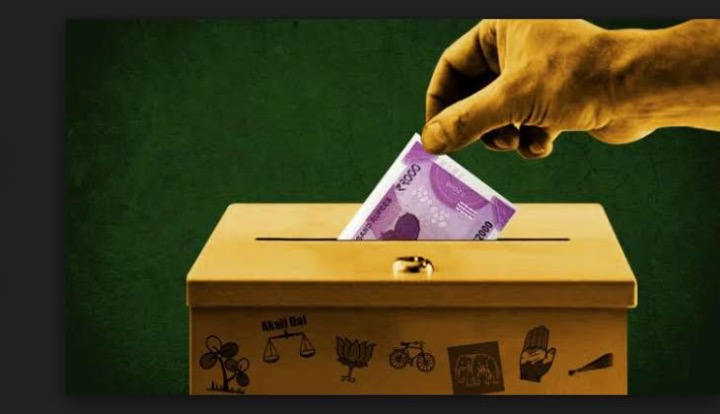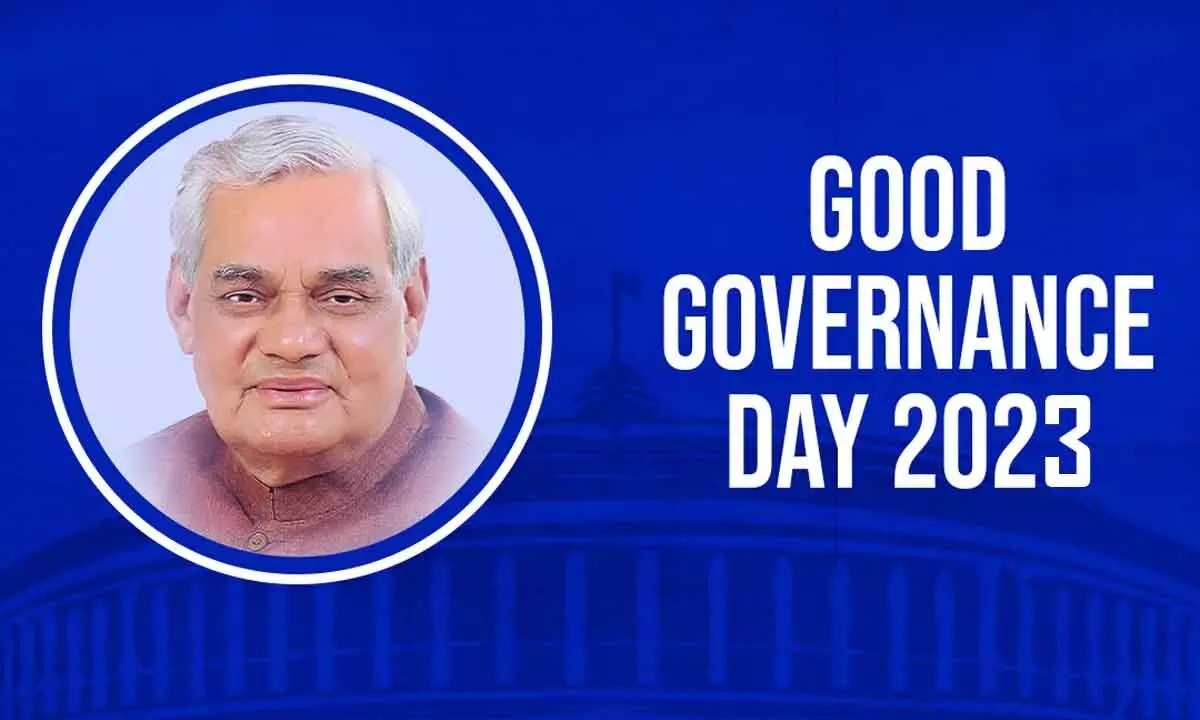Digital Governance in India

- 16 Jan 2025
In News:
India is making significant strides toward digital governance, an initiative aimed at enhancing both citizen services and the capabilities of government employees. This transition to a digitally-driven framework is designed to improve the efficiency, transparency, and accountability of government operations, positioning India as a global leader in modern governance practices.
What is Digital Governance?
Digital governance refers to the application of technology to enhance the functioning of government processes. By integrating digital tools and platforms, it aims to streamline administrative operations, reduce inefficiencies, and improve public service delivery. This approach also extends to ensuring greater transparency and accountability in government dealings.
Key Initiatives in Digital Governance
India has launched several critical initiatives to modernize governance through digital means. Some of the key programs include:
- iGOT Karmayogi Platform: The iGOT Karmayogi platform is a government initiative to provide online training to public employees. It aims to enhance public administration skills, foster expertise in data analytics, and equip employees with the necessary tools in digital technologies. This initiative aims to prepare government personnel to handle the challenges of a digitally evolving governance landscape.
- e-Office Initiative: The e-Office program is designed to reduce paper-based work by digitizing workflows within government departments. This initiative facilitates real-time communication among offices and ensures more efficient and transparent management of tasks. It also helps streamline decision-making processes and improves the speed of governance operations.
- Government e-Marketplace (GeM): The Government e-Marketplace (GeM) is an online platform developed to optimize procurement processes. It allows government agencies to procure goods and services efficiently, transparently, and with accountability. This platform has contributed to reducing corruption and ensuring that government purchases represent the best value for public money.
- Cybersecurity Training for Employees: As digital operations increase, ensuring the safety of sensitive data is paramount. The cybersecurity training program for government employees is designed to enhance their ability to recognize and respond to potential cyber threats. This initiative ensures data protection, safe online practices, and cyber resilience across digital governance platforms.
Challenges in Implementing Digital Governance
Despite its benefits, India faces several challenges in the successful implementation of digital governance. These obstacles must be addressed to unlock the full potential of technology-driven governance.
- Resistance to Technological Change: One of the key barriers to digital transformation in government is the resistance among employees to adopt new technologies. Many government officials remain accustomed to traditional, paper-based processes and are reluctant to transition to digital systems due to concerns about complexity and job security.
- Digital Divide in Rural Areas: While urban regions in India have better access to high-speed internet and digital infrastructure, many rural areas face significant digital divide challenges. Limited access to technology hampers the successful implementation of digital governance in these regions, restricting equitable service delivery across the country.
- Cybersecurity Risks: The rise of digital operations in governance increases the risk of cyberattacks and data breaches. With government data being digitized, the threat of cybercrimes becomes more pronounced, making it critical to implement robust cybersecurity measures and data protection strategies to safeguard sensitive information.
- Lack of Incentives for Training Outcomes: Although government employees are encouraged to take part in training programs such as iGOT Karmayogi, the absence of clear incentives to complete these programs can undermine their effectiveness. Establishing tangible rewards or career progression linked to the successful completion of training would encourage employees to fully engage in capacity-building initiatives.
Solutions to Overcome Challenges
To ensure the success of digital governance, several strategies must be put in place to address the challenges identified.
- Foster Innovation-Friendly Environments: Promoting an innovation-friendly culture within government offices can help reduce resistance to new technologies. Encouraging employees to engage with digital tools, offering regular training, and providing ongoing support will facilitate a smoother transition to a technology-driven governance system.
- Invest in Digital Infrastructure for Rural Areas: Addressing the digital divide requires significant investment in digital infrastructure in rural and remote areas. Ensuring that these regions have reliable internet access and the necessary technological resources will empower citizens across India to benefit from digital governance.
- Continuous Capacity-Building Programs: Establishing continuous training programs for government employees will ensure that they remain up-to-date with the latest technological trends. Regular updates to training content will help employees stay prepared to handle emerging challenges in digital governance.
- Strengthen Cybersecurity Protocols: To mitigate cybersecurity risks, it is essential to implement stringent cybersecurity measures across all levels of government operations. This includes regular cybersecurity awareness programs, proactive threat management systems, and rigorous data protection protocols to safeguard both government data and citizens’ personal information.
Conclusion
India’s shift towards digital governance represents a significant step toward modernizing administrative systems, enhancing transparency, and improving service delivery to citizens. However, challenges such as resistance to change, the digital divide, cybersecurity risks, and the lack of clear incentives for training must be addressed. By investing in digital infrastructure, offering continuous training programs, and reinforcing cybersecurity measures, India can create an effective and secure framework for digital governance that benefits both its citizens and the government workforce.
Draft Digital Personal Data Protection Rules, 2025

- 05 Jan 2025
In News:
The Government of India has introduced the long-awaited draft Digital Personal Data Protection Rules, 2025 to operationalize the Digital Personal Data Protection Act, 2023. These rules contain several significant provisions, including the controversial reintroduction of data localisation requirements, provisions for children's data protection, and measures to strengthen data fiduciaries' responsibilities.
This development holds substantial implications for both Indian citizens' data privacy and global tech companies, especially with respect to compliance, security measures, and data processing.
Data Localisation Mandates
Key Provision: The draft rules propose that certain types of personal and traffic data must be stored within India. Specifically, "significant data fiduciaries", a category that will include large tech firms such as Meta, Google, Apple, Microsoft, and Amazon, will be restricted from transferring certain data outside India.
- Committee Oversight: A government-appointed committee will define which types of personal data cannot be transferred abroad, based on factors like national security, sovereignty, and public order.
- Localisation Re-entry: This provision brings back data localisation, a contentious issue previously removed from the 2023 Data Protection Act after heavy lobbying by tech companies.
- Impact on Big Tech: Companies like Meta and Google had previously voiced concerns that strict localisation rules could hinder their ability to offer services in India, with Google arguing for narrowly tailored data localisation norms.
Role and Responsibilities of Data Fiduciaries
Key Provision: The rules lay out a clear framework for data fiduciaries, defined as entities that collect and process personal data.
- Significant Data Fiduciaries (SDFs): This subcategory will include entities that process large volumes of sensitive data, such as health and financial data. These companies will be held to higher standards of compliance and security.
- Data Retention: Personal data can only be stored for as long as consent is valid; after which, it must be deleted.
- Security Measures: Data fiduciaries must implement stringent measures such as encryption, access control, unauthorized access monitoring, and data backups.
Parental Consent for Children's Data
Key Provision: The draft rules include provisions aimed at protecting children's data, including mechanisms to ensure verifiable parental consent before children under 18 can use online platforms.
- Verification Process: Platforms must verify the identity of parents or guardians using government-issued identification or digital locker services.
- Exceptions: Health, mental health institutions, educational establishments, and daycare centers will be exempted from needing parental consent.
Data Breach Reporting and Penalties
Key Provision: In the event of a data breach, data fiduciaries are required to notify affected individuals without delay, detailing the breach's nature, potential consequences, and mitigation measures. Failure to comply with breach safeguards can result in penalties.
- Penalties for Non-Compliance: Entities that fail to adequately protect data or prevent breaches could face fines of up to Rs 250 crore.
- Breach Notification: The rules mandate timely reporting of all breaches, whether minor or major, and an emphasis on transparency in the breach notification process.
Safeguards for Government Data Processing
Key Provision: The draft rules seek to ensure that the government and its agencies process citizen data in a lawful manner with adequate safeguards in place.
- Exemptions for National Security and Public Order: The rules also address concerns that the government may process data without adequate checks by stipulating lawful processing and protections when data is used for national security, foreign relations, or public order.
Compliance Challenges for Businesses
Key Challenges: The introduction of these rules will impose several challenges for businesses, particularly tech companies:
- Consent Management: Companies will need to implement robust systems to handle consent records, allowing users to withdraw consent at any time. This will require significant infrastructure changes.
- Data Infrastructure Overhaul: Organizations will need to invest in data collection, storage, and lifecycle management systems to ensure compliance.
- Security Standards: Experts have raised concerns about the vagueness of certain security standards, which could lead to inconsistent implementation across sectors.
Penalties and Enforcement
Key Provisions:
- Penalties for Non-Compliance: Entities failing to adhere to the rules may face significant financial penalties, including fines up to Rs 250 crore for serious breaches.
- Repeat Violations: Consent managers who repeatedly violate rules could have their registration suspended or cancelled.
Conclusion:
The Digital Personal Data Protection Rules, 2025 bring important changes to India’s data privacy framework, particularly the reintroduction of data localisation and more stringent requirements for data fiduciaries. These rules aim to strengthen citizen privacy and ensure greater accountability from businesses. However, the challenges in compliance, especially for global tech firms, and the potential impact on service delivery, will need to be closely monitored as the final rules take shape.
Caste-Based Discrimination in Prisons

- 02 Jan 2025
In News:
The Union Ministry of Home Affairs has recently introduced significant revisions to the Model Prison Manual, 2016, and the Model Prisons and Correctional Services Act, 2023. These changes aim to eliminate caste-based discrimination in Indian prisons and establish a standardized approach to defining and treating habitual offenders across the country.
Background
In October 2024, the Supreme Court of India expressed concerns over the persistence of caste-based discrimination within prisons and the lack of consistency in how habitual offenders are classified. In response, the Court instructed the government to amend prison regulations to promote equality and fairness. The newly introduced reforms are in line with the Court's directives and focus on aligning prison practices with constitutional principles.
Addressing Caste-Based Discrimination in Prisons
The recent amendments take specific steps to combat caste-based discrimination within correctional facilities:
- Ban on Discrimination: Prison authorities are now mandated to ensure there is no caste-based segregation or bias. All work assignments and duties will be distributed impartially among inmates.
- Legal Provision Against Discrimination: A new clause, Section 55(A), titled "Prohibition of Caste-Based Discrimination in Prisons and Correctional Institutions", has been added to the Model Act, establishing a formal legal framework to address caste discrimination.
- Manual Scavenging Ban: The amendments extend the provisions of the Prohibition of Employment as Manual Scavengers and their Rehabilitation Act, 2013 to include prisons, prohibiting the degrading practice of manual scavenging or any hazardous cleaning within correctional facilities.
Redefining Habitual Offenders
The updated amendments also standardize the classification and treatment of habitual offenders, in accordance with the Supreme Court’s directions:
- Uniform Definition: A habitual offender is now officially defined as an individual convicted and sentenced to imprisonment for two or more separate offences within a continuous five-year period, provided the sentences were not overturned on appeal or review. Importantly, time spent in jail under sentence is excluded from this five-year period.
- National Consistency: States that do not have specific Habitual Offender Acts must amend their laws within three months to ensure consistency with the new national framework.
Importance of the Reforms
- Promoting Equality: These amendments seek to uphold the constitutional rights of prisoners, ensuring that all individuals, regardless of caste or background, are treated equally and with dignity.
- Eliminating Degrading Practices: The extension of the manual scavenging prohibition to prisons is a vital step in eliminating degrading and inhumane practices, ensuring a more humane environment for prisoners.
- Uniform Framework: The establishment of a standardized definition of habitual offenders ensures a consistent approach in handling repeat offenders across all states, reducing the possibility of arbitrary classifications.
Conclusion
The reforms introduced by the Union Home Ministry mark a significant milestone in India’s prison reform journey. By addressing caste-based discrimination and standardizing the classification of habitual offenders, these amendments reaffirm the country’s commitment to human rights and the rule of law. These changes not only improve the conditions within prisons but also set the stage for future reforms aimed at creating a fairer and more equitable correctional system.
Glass Ceiling Cracks: Women's Rising Role in the 2024 Lok Sabha Elections
- 28 Dec 2024
Introduction:
The 2024 Lok Sabha elections marked a significant step forward for women’s participation in Indian politics. With 800 women candidates contesting across 390 constituencies, this was the highest ever since the 1957 general elections. This surge in women candidates has been a positive reflection of the evolving role of women in India's democratic processes.
Increase in Women Candidates:
- A total of 800 women candidates participated in the 2024 elections, up from 726 in 2019.
- The number of constituencies with no female candidate dropped to a historic low of 152, from 171 in 2019.
- However, despite the rise in participation, only 74 women won, while 629 forfeited their deposits.
Regional Variations:
- The highest number of women candidates were from Maharashtra (111), followed by Uttar Pradesh (80) and Tamil Nadu (77).
- Some constituencies, like Baramati, Secunderabad, and Warangal, saw the highest participation of women, with eight candidates each.
Voter Turnout and Gender Dynamics:
- Women voters surpassed men in voter turnout for the second consecutive time, with 65.78% women casting their vote in 2024, compared to 65.55% of men.
- Assam’s Dhubri recorded the highest female voter turnout at 92.17%, reflecting increased female engagement in the electoral process.
Electoral Data and Gender Insights:
- In 2024, there were 47.63 crore female electors out of 97.97 crore total voters, making up 48.62% of the electorate, a slight increase from 2019.
- The number of female electors per 1,000 male voters reached 946, up from 926 in 2019, showing growing electoral inclusivity.
Challenges and Progress:
- Despite the gains in women’s representation, there remain several constituencies without any female candidates, notably in states like Uttar Pradesh (30 constituencies), Bihar (15), and Gujarat (14).
- Though women's participation has risen, the number of women who win remains disproportionately low, reflecting the challenges they face in a patriarchal political landscape.
Inclusion and Diversity:
- The 2024 elections also saw greater inclusivity, with a rise in third-gender electors, which increased by 23.5% to 48,272.
- Voter turnout among transgender voters nearly doubled, reaching 27.09% compared to 14.64% in 2019.
- Additionally, the number of persons with disabilities (PwD) electors increased to 90.28 lakh, showcasing broader electoral inclusivity.
Conclusion:
The 2024 Lok Sabha elections witnessed a remarkable increase in women’s participation, both as voters and candidates. While the journey toward full gender parity in politics continues, the trends from these elections indicate a growing shift toward more inclusive electoral processes. The data released by the Election Commission further underlines this progress, showing the increasing role of women in shaping India’s democratic future.
Supreme Court Directs Policy for Sacred Groves Protection

- 20 Dec 2024
In News:
Recently, the Supreme Court of India issued a significant judgment directing the Union Government to formulate a comprehensive policy for the protection and management of sacred groves across the country. These natural spaces, traditionally safeguarded by local communities, play a crucial role in preserving both ecological diversity and cultural heritage.
What are Sacred Groves?
Sacred Groves are patches of virgin forests that are protected by local communities due to their religious and cultural significance. They represent remnants of what were once dominant ecosystems and serve as key habitats for flora and fauna. Typically, sacred groves are not just ecological reserves, but also form an integral part of local traditions, often protected due to spiritual beliefs.
Key Features of Sacred Groves:
- Ecological Value: Sacred groves contribute significantly to biodiversity conservation.
- Cultural Significance: These groves are revered in various religious practices and are central to local traditions.
- Geographical Presence: Sacred groves are found in regions like Tamil Nadu, Kerala, Karnataka, Maharashtra, and parts of Rajasthan.
Supreme Court's Directive
The court's judgment was based on a plea highlighting the decline of sacred groves in Rajasthan, particularly those being lost due to deforestation and illegal land-use changes. While the Wildlife (Protection) Act of 1972 empowers state governments to declare community lands as reserves, the court recognized the need for a unified national policy to protect sacred groves as cultural reserves.
Recommendations:
- Nationwide Survey: The Ministry of Environment, Forest, and Climate Change (MoEF&CC) was instructed to conduct a nationwide survey to map and assess sacred groves, identifying their size and extent.
- Legal Protection: Sacred groves should be recognized as community reserves and protected under the Wildlife (Protection) Act, 1972.
- State-Specific Measures: The Rajasthan government was specifically directed to carry out detailed mapping (both on-ground and satellite) of sacred groves within the state, ensuring that the groves are recognized for their ecological and cultural significance.
The Role of Sacred Groves in Conservation
Sacred groves play a pivotal role in the conservation of biodiversity. They serve as refuges for various plant and animal species, and the traditional practices associated with these groves, such as tree worship, discourage destructive activities like logging and hunting.
Ecological and Cultural Importance:
- Sacred groves often act as critical biodiversity hotspots, preserving rare and indigenous species.
- They help maintain clean water ecosystems and act as carbon sinks, contributing to climate mitigation.
- Practices of non-interference with these areas have allowed flora and fauna to thrive over centuries.
Cultural Significance Across India
The importance of sacred groves is deeply embedded in India's diverse cultural heritage. They are considered the abode of deities, and various regions have unique names and rituals associated with these groves.
Examples of Sacred Groves in India:
- Himachal Pradesh: Devban
- Karnataka: Devarakadu
- Kerala: Kavu
- Rajasthan: Oran
- Maharashtra: Devrai
Piplantri Village Model
A key example highlighted in the judgment was the Piplantri village in Rajasthan, where the community undertook a remarkable transformation of barren land into flourishing groves. The initiative, driven by local leadership, involves planting 111 trees for every girl child born, which has led to several environmental and social benefits.
Impact of Piplantri's Community Efforts:
- Over 40 lakh trees have been planted, which has recharged the water table by 800-900 feet and lowered the local climate by 3-4°C.
- The initiative has contributed to the reduction of female foeticide and empowered women's self-help groups.
- The village now enjoys economic growth, better education opportunities, and increased local income.
Legal and Statutory Framework
Sacred groves are already recognized under existing Indian laws, notably the Wildlife (Protection) Act, 1972, which allows states to declare sacred groves as community reserves. Additionally, the National Forest Policy of 1988 encourages the involvement of local communities in the conservation of forest areas, a principle supported by the Godavarman Case of 1996.
Key Legal Provisions:
- Wildlife (Protection) Act, 1972: Empowers state governments to declare sacred groves as community reserves.
- National Forest Policy, 1988: Encourages community involvement in the conservation and protection of forests, including sacred groves.
- Scheduled Tribes and Other Traditional Forest Dwellers (Recognition of Forest Rights) Act, 2006: Suggests empowering traditional communities as custodians of sacred groves.
Looking Ahead: The Need for Action
The Supreme Court has scheduled further hearings to assess the progress of the survey and mapping efforts by Rajasthan. The court also stressed the importance of empowering traditional communities to continue their role as custodians of sacred groves, ensuring their sustainable protection for future generations.
By recognizing the ecological and cultural significance of sacred groves and encouraging community-driven conservation efforts, the Supreme Court’s ruling sets a precedent for more inclusive environmental policies in India. This could also inspire similar initiatives in other parts of the world, promoting the protection of sacred natural spaces for their critical role in maintaining biodiversity and fostering sustainable communities.
Reimagining Governance with AI: The Promise of GovAI

- 20 Nov 2024
In News:
India's rapid digital transformation, coupled with the advancements in Artificial Intelligence (AI), presents a unique opportunity to reimagine governance. The concept of GovAI—using AI to enhance public administration—holds the potential to revolutionize governance, improve efficiency, and create more responsive and inclusive public systems.
Digital Transformation in Governance
- Evolution of Digital Public Infrastructure (DPI)
- Over the past decade, India has made significant strides in digital governance through the development of Digital Public Infrastructure (DPI). DPI has reduced inefficiencies, enhanced transparency, and improved service delivery, transforming India's governance landscape.
- Impact of AI on Governance
- As AI becomes a critical enabler in various sectors, its application to governance promises to deliver more efficient, inclusive, and responsive government services. The potential of AI lies in its ability to provide more with less, driving innovation across key public services.
Key Trends Driving GovAI
- Rapid Digitalization of India
- Currently, 90 crore Indians are connected to the Internet, with projections indicating 120 crore by 2026, positioning India as the most connected country globally.
- Digitalization serves as the backbone for AI-driven governance, enabling efficient data collection, analysis, and informed policy-making.
- Data as a Valuable Resource
- The rapid digitalization of India has led to the generation of vast amounts of data. This data serves as the fuel for AI models, which can be used to enhance governance.
- Programs like the IndiaDatasetsProgramme aim to harness government datasets for AI development while safeguarding data privacy through legislation.
- Demand for Efficient Governance
- The post-COVID world has underscored the need for governments to deliver better outcomes with fewer resources. AI has the potential to optimize the use of public resources, enabling more efficient and targeted governance.
India’s Leadership in AI-Driven Governance
- Positioning India as a Global Leader
- India’s digital governance initiatives have placed it at the forefront of AI adoption in the public sector. Through GovAI, India can solidify its position as a global leader in using technology for public good.
- As the Chair of the Global Partnership on AI (GPAI), India is advocating for the inclusive development of AI to ensure that it benefits all nations, not just a select few.
- Role of Innovation Ecosystem
- India’s innovation ecosystem, comprising startups, entrepreneurs, and tech hubs, can play a crucial role in driving the development of AI models, platforms, and apps for governance.
- A strong partnership between the government and private sector is essential to successfully deploy AI solutions across various sectors of governance.
Potential Benefits of GovAI
- Enhanced Efficiency and Service Delivery
- AI-powered tools, such as chatbots, can provide citizens with 24/7 assistance, streamlining public service delivery and reducing waiting times.
- AI can help in automating processes and improving the overall efficiency of government operations.
- Data-Driven Decision-Making
- AI can analyze large datasets to make informed policy decisions and design targeted interventions in sectors like healthcare, education, and social welfare.
- Data-driven insights can enhance the effectiveness of welfare schemes, improving outcomes for marginalized communities.
- Increased Transparency and Accountability
- AI can enhance transparency in governance by minimizing human intervention in processes, thus reducing corruption and ensuring efficient use of public resources.
- Predictive analytics and real-time data monitoring can enable proactive governance, preventing issues before they escalate.
Challenges and Drawbacks of GovAI
- Privacy Concerns
- The use of AI in governance requires the collection and analysis of vast amounts of personal data, raising concerns about data privacy and surveillance.
- Robust data protection laws must be enforced to ensure citizens' data is handled responsibly.
- Accountability and Bias
- AI systems may produce biased outcomes depending on the data they are trained on. Ensuring accountability for decisions made by AI systems remains a challenge, particularly when errors or biases occur.
- Transparent mechanisms must be established to hold AI systems accountable for their actions.
- Increased State Control and Surveillance
- The integration of AI in governance could lead to increased state control, potentially compromising individual freedoms. Ensuring that AI is used responsibly to balance power between the government and citizens is critical.
- Digital Divide
- The benefits of AI in governance may not be evenly distributed across the population, exacerbating the digital divide.
- Efforts must be made to ensure that marginalized communities, without access to digital technologies or skills, are not left behind.
Conclusion
- Balancing Benefits and Risks
- The integration of AI into governance systems presents significant benefits, including enhanced efficiency, transparency, and proactive governance. However, there are challenges related to privacy, accountability, and state control.
- To ensure AI serves the public good, India must implement strong regulatory frameworks, promote transparency, and develop ethical AI systems that respect citizens’ rights and freedoms.
- Moving Toward Maximum Governance
- AI can help realize the vision of maximum governance, enabling more effective and targeted interventions across sectors like healthcare, security, education, and disaster management.
- The success of GovAI will depend on a trusted partnership between the government, private sector, and innovation ecosystem, ensuring that AI technology serves the larger public interest.
CAA Rules go against equality, federalism and India’s Constitution

- 13 Mar 2024
Why is it in the News?
Although protecting persecuted individuals is commendable, the ideal solution is to grant refugee status to all, irrespective of their religious affiliation.
Context:
- India has been engaged in heated discussions over the Citizenship Amendment Act (CAA) since its inception in 2019.
- The recent issuance of Rules under the CAA by the Union government has sparked renewed debates concerning its impact on India's constitutional secularism.
- Amid these discussions, it is crucial to assess the CAA's provisions, their effects on citizenship, and the wider socio-political consequences they carry.
Concerns Surrounding the Citizenship Amendment Act:
- Selective Approach to Citizenship: The Citizenship Amendment Act (CAA) of 2019 amends India's Citizenship Act of 1955 and introduces a selective approach to granting citizenship.
- This selective approach is a significant point of contention, as it differentiates between individuals based on their religious identity.
- Preferential Treatment for Certain Religious Groups: The CAA expedites the citizenship process for undocumented immigrants belonging to Hindu, Sikh, Buddhist, Jain, Parsi, and Christian communities from Pakistan, Afghanistan, and Bangladesh.
- However, the Act explicitly excludes Muslims from these provisions, which has led to considerable debate and criticism.
- Violation of Secular Principles: Critics argue that the CAA violates the secular principles enshrined in India's Constitution.
- Secularism, a foundational tenet of India's democratic ethos, mandates that the state remain neutral in matters of religion and guarantee equal rights and protections to all citizens, regardless of their faith.
- Discriminatory Nature: The CAA's exclusion of Muslims from its purview has been perceived as discriminatory and runs counter to India's historical commitment to religious pluralism and tolerance.
- This discriminatory nature has sparked widespread protests and highlighted deep divisions within Indian society regarding citizenship, identity, and secularism.
- Upholding Constitutional Principles: The protests against the CAA underscore the importance of upholding constitutional principles and safeguarding the rights of all citizens, irrespective of their religious affiliation.
- This controversy serves as a reminder of the need for inclusive and non-discriminatory policies that respect the diversity of India's population.
Potential Implications of the Notified Rules under the Citizenship Amendment Act:
- Streamlined Citizenship Process: The notified Rules streamline the citizenship application process by providing clear procedures and documentation requirements.
- This standardization can potentially expedite the citizenship-granting process, allowing eligible individuals to secure legal status more efficiently.
- Lenient Proof Requirements: The Rules offer leniency in requirements for proof of nationality and residence, accepting various documents as evidence.
- This flexibility may enable more individuals to establish their eligibility for citizenship under the CAA.
- Centralisation of Authority: The notified Rules centralize the citizenship-granting process at the national level, with an empowered committee formed by the Union government now responsible for processing applications.
- This centralisation consolidates power at the national level, potentially reducing the role of local authorities in decision-making and grassroots-level accountability.
- Legal and Constitutional Challenges: The Rules are likely to face legal and constitutional challenges, particularly regarding their compatibility with India's constitutional principles and international legal standards.
- Critics argue that the CAA and its accompanying Rules violate the constitutional guarantee of equality before the law (Article 14) by discriminating based on religion.
- Contradictions and Regional Discontent: The implementation of the CAA has exposed internal contradictions within India's citizenship laws, particularly in the case of Assam.
- The discrepancy between Section 6A of the Citizenship Act, 1955, and the provisions of the CAA has fuelled discontent among local communities and complicated the citizenship landscape.
- Overall, the notified Rules under the Citizenship Amendment Act have significant implications for the citizenship-granting process, the balance of power between national and local authorities, and the interpretation of constitutional principles.
- As the legal and societal debates surrounding the CAA continue, these implications will likely shape the discourse on citizenship and belonging in India.
Moving Toward Inclusive Solutions: Addressing the Concerns Raised by the Citizenship Amendment Act:
- To address the concerns raised by the Citizenship Amendment Act (CAA) and its accompanying Rules, it is crucial to adopt a more inclusive approach that aligns with international humanitarian norms and India's commitment to secularism.
Here are some steps that can be taken:
- Inclusive Protection for Persecuted Individuals: Instead of granting citizenship based on religious affiliation, India should consider offering refugee status to all persecuted individuals, regardless of their religion.
- This approach would be in line with international humanitarian norms and would uphold the principle of secularism enshrined in India's Constitution.
- Ratification of International Conventions: Ratifying international conventions such as the Geneva Convention Relating to the Status of Refugees would demonstrate India's commitment to protecting vulnerable populations and ensuring their rights.
- This step would also bring India in line with global standards for refugee protection.
- Reevaluation of the Citizenship Amendment Act: Given the concerns surrounding the CAA's compatibility with constitutional principles and its potential for discrimination, it is essential to reevaluate the Act's provisions.
- This process should involve a thorough examination of the CAA's impact on vulnerable communities and its alignment with India's democratic values.
- Upholding Constitutional Values: To ensure that the CAA and other legislation adhere to India's core values, it is crucial to reaffirm the principles of equality, non-discrimination, and secularism as outlined in the Constitution.
- Policies and laws should be crafted to uphold these principles and protect the rights of all individuals, irrespective of their religious affiliation.
- By taking these steps, India can work toward addressing the concerns raised by the Citizenship Amendment Act and foster a more inclusive approach to citizenship that aligns with the nation's historical commitment to diversity and pluralism.
Voters must know who funds political parties. This is the right that Supreme Court has protected

- 11 Mar 2024
Why is it in the News?
The Supreme Court of India has recently mandated the public disclosure of all pertinent information regarding corporate funding of political parties, with the State Bank of India and other entities directed to comply with the court's directive.
Context:
- The recent landmark ruling by the Supreme Court's Constitution Bench, led by the Chief Justice of India, represents a pivotal moment in Indian democracy.
- This ruling specifically addresses the legality of the Electoral Bond Scheme (EBS) initiated through the Finance Act of 2017.
- Beyond its immediate implications, the verdict underscores fundamental principles such as equality, transparency, and proportionality concerning corporate contributions to election funding.
What is the Supreme Court verdict on the Electoral Bond Scheme?
- Nullification of Electoral Bond Scheme: The Supreme Court declared the Electoral Bond Scheme (EBS) unconstitutional, citing concerns over unrestricted donations, anonymity of contributions via promissory notes, and exemption of corporate donors from disclosure obligations.
- This underscores the imperative of transparency in corporate election financing, aligning with constitutional rights outlined in Article 14 (equality) and Article 19(1)(a) (right to information).
- Immediate Cessation of Electoral Bonds and Disclosure Mandates: The Court mandated the immediate cessation of electoral bonds and directed all pertinent authorities to disclose relevant information dating back to April 12, 2019.
- The State Bank of India's request for an extension was met with skepticism, prompting a contempt petition against them for non-compliance.
- Guidelines on Legislative Passage via Money Bill Route: While the verdict didn't specifically address the Speaker's authority to classify bills as money bills, it offered guidance suggesting that not all legislative determinations qualify as financial or economic decisions.
- This challenges the presumption of constitutionality and underscores the need for a nuanced approach in evaluating bills passed via the money bill route.
What is the Reason Behind SC's Scrutiny of Electoral Bond Scheme (EBS)?
- Elimination of Donation Caps: The court closely examined the EBS due to its elimination of donation caps imposed on political parties, as outlined in the Finance Act 2017.
- This removal of restrictions allowed for unrestricted inflow of funds into electoral campaigns, posing a potential threat to the democratic principle of a level playing field.
- Anonymity of Donations via Promissory Notes: An area of concern highlighted by the court was the provision in the EBS allowing for anonymous donations to political parties through promissory notes issued by recognised banks.
- This mechanism raised significant issues regarding transparency and accountability, as it enabled substantial financial backing to political entities without disclosing the identity of the contributors.
- Exemption of Corporate Donors from Disclosure Requirements: The EBS faced scrutiny for exempting corporate donors from the obligation to disclose their contributions in balance sheets, a highly contentious feature.
- This exemption created opacity surrounding corporate funding of political parties, undermining the transparency necessary for a robust democratic process.
SC’s Analysis of the Proportionality Doctrine: Its Implications on Legislative Goals and the Restriction of FR
- Evolution of the Proportionality Doctrine: The judgment highlights the proportionality doctrine as a tool for self-discipline in constitutional judicial review, aimed at balancing governmental powers with individual rights
- Serving as a foundational aspect of constitutional discipline, it establishes parameters applicable to all governance institutions.
- Differentiation Between Manifest Arbitrariness and Reasonable Exercise of Power: A crucial distinction is drawn between manifest arbitrariness and the reasonable exercise of power, with the court emphasizing that restricting a fundamental right does not equate to abrogating it entirely.
- This distinction safeguards against arbitrary exercise of governmental authority, stressing the necessity for reasonable and proportionate limitations on rights.
- Legitimate Goals and Appropriate Means: Applying the proportionality test, the court scrutinizes the legislative objectives behind the Electoral Bond Scheme, mandating that any restriction on a fundamental right must serve a legitimate goal and utilize suitable means.
- Questions are raised regarding the legitimacy of curbing black money as a specific ground under Article 19(2), emphasizing the need for the state to justify its actions with reasonable objectives.
- Nexus Between Law and Stated Objectives: Introducing the concept of a reasonable nexus, the court holds that laws should demonstrate a rational connection between means employed and objectives sought to be achieved.
- This requirement ensures that restrictions on fundamental rights are directly related to their intended purpose, avoiding arbitrary infringements.
- Balancing Conflicting Rights: A notable development is the introduction of the double proportionality test, addressing conflicts between equal rights such as donor privacy and voter information and influence.
- The court mandates a secondary proportionality assessment to ensure that any infringement on one right is justified and not disproportionate in impact.
- Alternative Measures and Judicial Restraint: While advocating proportionality, the court suggests alternative measures to achieve legislative goals, such as setting up electoral trusts or imposing caps on corporate funding.
- Additionally, it exercises judicial restraint, respecting the autonomy and powers of the executive and legislative branches.
- Chief Justice M C Chagla's Warning: The judgment recalls Chief Justice M C Chagla's 1958 caution regarding the influential role of big business and money in democracy, highlighting a long-standing concern about corporate influence.
- Chagla's foresight underscores the judiciary's role in preventing improper or corrupt influence, emphasizing the need to safeguard democratic values.
- Historical Perspectives by the CJI: Chief Justice Chandrachud's historical perspective underscores the judiciary's responsibility to prevent improper influences on democracy, advocating for a proactive role in safeguarding democratic values.
- The court's assertion aligns with the idea of acting as a check against attempts to compromise the democratic process, particularly by powerful corporate entities.
Conclusion
The Supreme Court's nullification of the Electoral Bond Scheme is a staunch defense of democratic principles. By rejecting elements that undermine transparency, equality, and accountability, the court reaffirms core democratic values. This landmark ruling signifies a crucial juncture in India's legal narrative, establishing a precedent for safeguarding democracy against opaque financial influences.
Good Governance Day: Last-mile delivery, leaving no one behind is key to growth (Indian Express)

- 25 Dec 2023
Why is it in the News?
Good Governance Day 2023 is being celebrated today on the birth anniversary of former Prime Minister Atal Bihari Vajpayee, which falls on December 25th.
About Good Governance Day:
- December 25 marks the birth anniversary of the late Prime Minister and Bharatiya Janata Party leader, Atal Bihari Vajpayee.
- Origin: In 2014, the Prime Minister of India Narendra Modi declared December 25 as "Good Governance Day" to be celebrated nationwide.
Significance of Good Governance Day:
- Raising Governance Awareness: Good Governance Day aims to raise awareness among citizens regarding government accountability and efficient administration.
- Equitable Treatment of Citizens: This day emphasizes the fair and prompt delivery of various government services to ensure equitable treatment for the country's residents.
- Advancement of e-Governance: National Good Governance Day endeavors to advance "e-Governance" with the official event slogan being "Good Governance through e-Governance.
What is Good Governance?
- Governance encompasses the decision-making process and the subsequent implementation (or lack thereof) of those decisions.
- It manifests in various contexts, including corporate governance, international governance, national governance, and local governance.
- It is characterized as "the manner in which power is exercised in the management of a country's economic and social resources for development."
- This concept, rooted in historical perspectives, was elaborated by Chanakya in the Arthashastra.
- Foundation of Citizens Centric Administration: The cornerstone of a citizens-centric administration lies in the principles of good governance, emphasizing transparency, accountability, and equitable societal development.
8 Principles of Good Governance:
- Participation: Ensures the inclusion of diverse perspectives, including men, women, vulnerable sections, backward classes, minorities, etc.
- Upholds freedom of association and expression.
- Rule of Law: Impartial enforcement of the legal framework, particularly in human rights laws.
- A foundation for preventing the 'law of fish,' where the strong prevail over the weak.
- Consensus Oriented: Facilitates decision-making that aims for a common minimum acceptable to everyone, fostering a broad consensus.
- Mediates differing interests toward a mutually beneficial outcome.
- Equity and Inclusiveness: Strives for an equitable society, ensuring opportunities for all to enhance or maintain their well-being.
- Effectiveness and Efficiency: Focuses on processes and institutions that yield results meeting the community's needs.
- Maximizes the effective utilization of community resources for optimal output.
- Accountability: Demands accountability from governmental institutions, private sectors, and civil society organizations to the public and institutional stakeholders.
- Aims for governance that serves the betterment of the people.
- Transparency: Requires accessible, understandable, and monitored information.
- Advocates for a free media and public access to information.
- Responsiveness: Dictates that institutions and processes serve all stakeholders within a reasonable timeframe.
What is the Significance of Good Governance?
- Safeguarding Public Interests: The implementation of good governance practices is crucial for safeguarding the interests of the public.
- Optimal Resource Utilization: Good governance empowers organizations to maximize the efficient utilization of available resources, facilitating the delivery of high-quality services.
- Ensuring Checks and Balances: Through good governance practices, mechanisms are established to prevent the undue exercise of power and authority, maintaining a system of checks and balances.
- Facilitating Public Engagement: The active involvement of the public in the governance process becomes achievable when good governance practices are firmly in place.
What are the Challenges to Good Governance in India?
- Corruption: The pervasive level of corruption in India is widely recognized as a substantial impediment to enhancing the quality of governance.
- Empowerment of Women: The inadequate representation of women in government institutions and related sectors poses a significant challenge to achieving gender equality.
- Delayed Justice: Ensuring timely justice for citizens is a fundamental right, but numerous factors, such as a shortage of personnel and logistical resources within the legal system, contribute to delayed justice.
- Criminalization of Politics: The intertwining of the political process with criminal elements and the collaboration between politicians, civil servants, and business entities negatively impact public policy formulation and governance.
- Centralization of Administrative System: Efficient functioning of lower-level governments, particularly Panchayati Raj Institutions (PRIs), depends on adequate empowerment.
- The existing challenges involve insufficient devolution of funds and personnel to carry out constitutionally assigned functions.
What are the Initiatives for Enhancing Good Governance in India?
- National e-Governance Plan: With a vision to make government services easily accessible to the common man, the National e-Governance Plan aims to ensure efficiency, transparency, and reliability of services at affordable costs.
- The plan focuses on meeting the basic needs of the public through widespread service delivery outlets.
- Good Governance Index (GGI): Launched by the Ministry of Personnel, Public Grievances & Pensions, GGI serves as a comprehensive tool to evaluate the state of governance in the country.
- It systematically analyzes the impact of various interventions initiated by State Governments and Union Territories.
- Right to Information Act, 2005: This crucial legislation plays a pivotal role in fostering transparency within governance by granting citizens the right to access information.
- The Right to Information Act, 2005, empowers individuals to seek and receive information, contributing to a more transparent and accountable system.
About Atal Bihari Vajpayee
- Atal Bihari Vajpayee, the 10th Prime Minister of India, distinguished himself not only as a statesman but also as a revered poet and literary figure.
- His association with the Rashtriya Swayamsevak Sangh (RSS), the ideological precursor of the BJP, further shaped his political journey.
- Early Life: Born on December 25, 1924, in Gwalior, Madhya Pradesh, Vajpayee joined the RSS in 1939, transitioning into a full-time role in 1947.
- His literary prowess led him to collaborate with Deen Dayal Upadhyaya on various publications, marking the beginning of his impactful career.
- Political Ascension: Vajpayee assumed the role of national president of the Jana Sangh in 1968 following Deen Dayal Upadhyaya's demise.
- His political journey commenced with his election to the Lok Sabha from the Balrampur seat in the 1957 general election, where his eloquence positioned him as a defender of Jana Sangh's policies.
- Key Political Milestones: Post-emergency, Vajpayee played a vital role in the formation of the Janata Party, securing victory in the 1977 general elections and subsequently serving as the External Affairs Minister.
- The transformation of Jana Sangh into the Bharatiya Janata Party (BJP) in 1980 marked a significant phase under his leadership, with the party gaining electoral prominence.
- Political Tenures: Vajpayee's political career saw him elected ten times to the Lok Sabha and twice to the Rajya Sabha, representing constituencies such as Balrampur, New Delhi, Gwalior, and Lucknow.
- His administrative journey commenced as the External Affairs Minister in 1975, with commendation for his UN General Assembly speech in Hindi.
- Prime Ministerial Stints: Vajpayee served as the Prime Minister of India in three distinct tenures:
- A brief 13-day term in 1996
- 13-month period from 1998 to 1999, and
- A full term from 1999 to 2004.
- Notable Achievements: Vajpayee's administration left an indelible mark with achievements such as the Pokhran Nuclear Test, success in the Kargil War, the implementation of the Golden Quadrilateral project, the Pradhan Mantri Gramin Sadak Yojana, and the Sarva Siksha Abhiyaan.
- Diplomatic Outreach: Vajpayee's diplomatic efforts included a groundbreaking bus journey to Lahore to meet with Pakistani Prime Minister Nawaz Sharif, signaling a commitment to improving relations.
- Honors and Recognition: Atal Bihari Vajpayee was bestowed with prestigious honors, including the Bharat Ratna in 2015, recognition for his role in the Bangladesh Liberation War, and the Order of Ouissam Alaouite from Morocco.
- Additionally, the Government of India designated his birth anniversary as Good Governance Day in 2014.
